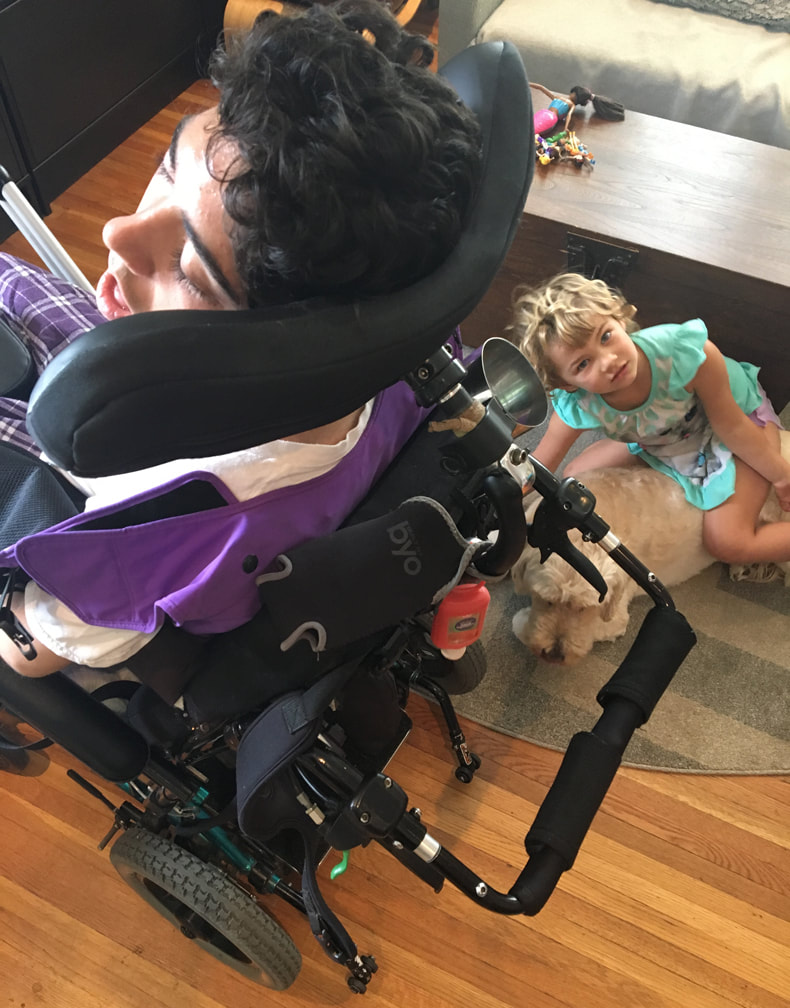|
One of my life challenges is navigating a world where the majority of people I encounter feel only sorrow for my son, Julius. I prefer those who feel nothing over sorrow, because nothing is easier to walk away from. Nothing can't stick. Sorrow knows how to linger and accumulate and it is annoyingly sticky.
Value, though, has the power to transform sorrow. Value is linked with purpose and integrity. But value is very difficult to demonstrate through the body of a life so severely impaired and fragile, in a world where comparativeness is part of human wiring. "What does he cost us (society)?" someone once asked theoretically and economically speaking. "He should be dead!!" a person screamed repeatedly in the park one day while pointing at my son. "He's not a candidate for a speech device," the school pathologist reported. "We cannot support your request for a power wheelchair unless he can demonstrate that he can use one" said his physical therapist under the state program for children with disabilities. "But, how can he develop the ability to use a power chair if he doesn't have one to use?" I pushed. Years ago, when I visited the Holocaust Memorial Museum in D.C I learned that the first people killed under Hitler were not executed for being Jewish. They were people with disabilities seen as having no value and no purpose, a burdensome economic expense. With sorrow being non-existent, this made for a grossly abusive combination of judgements embraced by those in power. It's been hard to keep nurses on the clock who prefer easier cases for the same pay once they see the magnitude of Julius' dependency and the workload for his care, especially now that he has the body of a young man, rather than a child. But the ritual of his physical necessities in my hands, has become a natural pattern that is layered and can be complicated, but is not difficult once in motion. My son and I have the most intimate conversations-even when they aren't spoken. During focused moments when I am caring for him and his body, the rest of the world falls away. It is very similar to when I am making art. So I realized, this caretaking is also my art, this process, and that is how the two roles merged for me in my life and work where value is inherent just because it is, whether or not it is noticeable to others, whether or not my ability and my value are underestimated, like his. I use the word "caretaking" instead of "caregiving" which is more common in this arena (and may be more differentiating from a social perspective.) "Caretaking" fits me better because I take away something of value that is given up by the person being cared for, my son. While "caregiving," feels one-sided: to give care (and possibly myself or parts of myself) away as in a martyrdom. I can't always find the words to describe Julius' value, even on days when I feel that I am fighting everything or everyone for him, for us (or especially on these days.) But tonight, unexpectedly, his little sister described her brother's value perfectly: In our self-imposed home quarantine, my four-year-old was playing on the living room rug. I was giving Julius his tube feeding while we were getting the Coronavirus update. My daughter was lost in a world of princesses. And then without any relevance that I could find, she said, "Mom, Julius knows how to make me happy when I am sad or mad." "Yes," I said, "he does know how to do that. He knows how to make me happy when I am sad or angry, too." Be safe everyone, if not for yourself, for those more fragile, but just as valuable.
1 Comment
|
Archives
March 2020
Categories |
Menu
Alice Marie Perreault

 RSS Feed
RSS Feed
